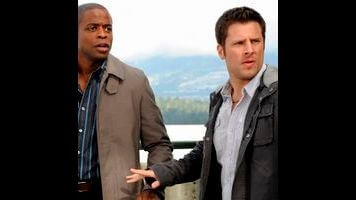Psych: “Right Turn Or Left For Dead”

I had a girlfriend during the first half of college whose favorite movie was Sliding Doors. The cross-cutting between two realities gimmick is a clever trick (though I never did quite get over seeing Jonathan from The Mummy in a serious role, at least until Spartacus), but I exaggerated my interest in the film significantly in order to please my significant other. (The things we do for the ones we love.) Sliding Doors, like Melinda & Melinda and other films in this vein, comes off as mostly a style experiment with some probing, existential questions about the effect of little differences out of our control, unlike something along the lines of the split-screen sequence in (500) Days of Summer, which exist as small stylistic flourish within a larger work, reflecting on the character with the “expected” fantasy.
Though it cuts between realities instead of depicting them both on screen for the entire hour, this split reality episode of Psych has much more in common with Marc Webb’s debut film than it does with Sliding Doors or Melinda. One half of the plot depicts the actual events, while the other half are projections of Shawn’s imagination had he been able to keep up the ruse of his psychic abilities and not let Juliet in on his secret. The brighter, sunnier scenes represent Shawn’s ideal version of events, while the cooler color palette depict the aftermath of the actual events at Lassiter’s wedding.
At first, when replaying the final scene from last week, it’s boring, but once the plot rewinds and Shawn begins inventing the alternate timeline with a positive initial outcome—one in which the mysterious woman he takes to the hospital winds up in the morgue as a murder victim, the first signifier that the “happy” branch of reality is out of balance.
In both plots, the Santa Barbara police investigate a string of mysterious deaths related to a young Swedish woman—dead in one plot, alive and in the hospital in the other. The investigation weaves together a few successful Swedish authors and the woman’s stepfather, but it’s all in service of showing Shawn and Juliet’s relationship in destroyed reality alongside such a happy idealistic vision that Jules tells Shawn that a riverbank where he finds a gun for evidence would be a romantic place to propose to her.
In the positive branch, there’s much more comedy. Lassiter’s increasing attachment to the puppy Juliet and Shawn get him only grows more adorable with every scene, and Dulé Hill’s increasingly serious allergic reaction to biscotti shows off his gift for physical comedy. But the other plot has its moments, as when Shawn visits his father to tell him about Juliet ending their relationship. Henry’s reactions, and Jeffrey Tambor’s few lines, make it the only great bit of comedy in that side of the plot. But although the episode checks the requisite boxes for laughs, it’s more serious, ostensibly setting up whether the romantic troubles between Shawn and Juliet will last longer than a day.
The best part about “Right Turn Or Left For Dead” is that it doesn’t let Shawn off the hook for his deception. Though he’s hallucinating throughout the episode, shifting between the real aftermath of Juliet’s realization and his fantasy where he avoided discovery, in the end, that initial circumstance doesn’t matter. As Juliet says in the final scene: Eventually, somehow, Shawn’s lie would come to light, and then they’d be in the exact same situation. Not only does Shawn hallucinate a weak version of Juliet who gets over his biggest lie almost immediately—a flippant, “Women, am I right?” disregard for the woman he supposedly loves so much—but he tries to play it off like the only thing he did wrong was give her the jacket, which accidentally exposed the lie. In Shawn’s incredibly observant mind, his fault is not concealing his lie better, and that fundamental oversight is what he needs to overcome.
Anyone could see that final fake out from miles away, but I was surprised at how well the episode collapsed into one plot. Shawn weaves both realities together in a way that informs the case in a way that is rarely as impressive or well written as it is here. For a moment, he’s an impressively observant police consultant, but then once the case is over, Jules is back to questioning Shawn’s motives for lying for so long. This romantic split will be the dominant storyline for the rest of the season, no matter how badly I wish Lassie and Lassie Jr. had their own episode to themselves to run around getting into terrible mischief. But it’s a lot easier to watch the inevitable slow crawl of the romantic plot when an episode uses an engaging structure a good dose of release-valve laughs that breaks the relationship tension.
Stray observations:
- Jeffrey Tambor again! Glad he’s in more than one episode, but he needs more screen time if they’re going to bring him in again.
- Gus is in a Fantasy Floorball League, and fits in better with the Swedish ex-pats than Shawn.
- “Even if that’s something that actually exists…” —Shawn talking to Gus about floorball,